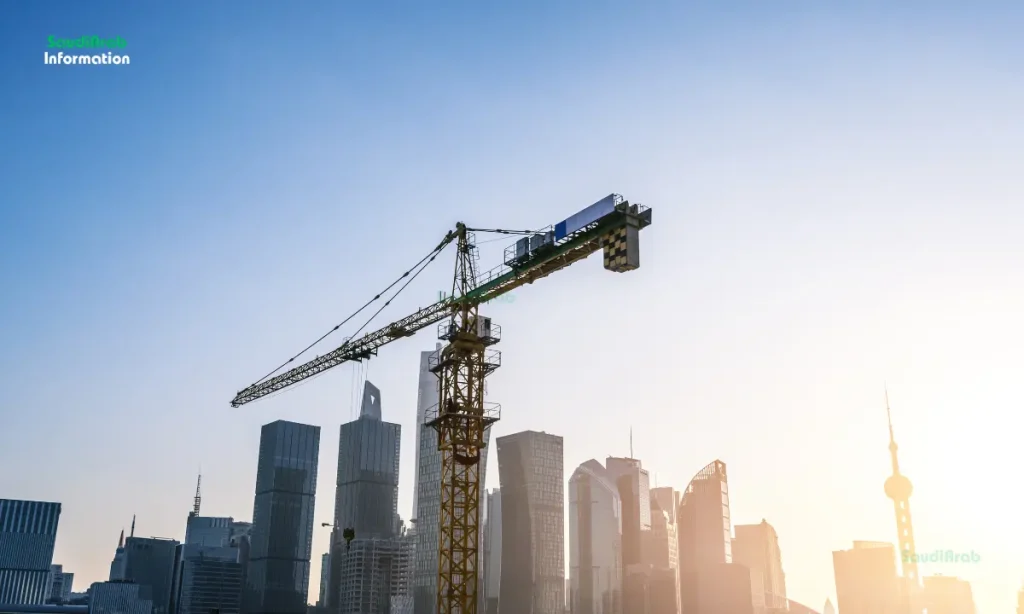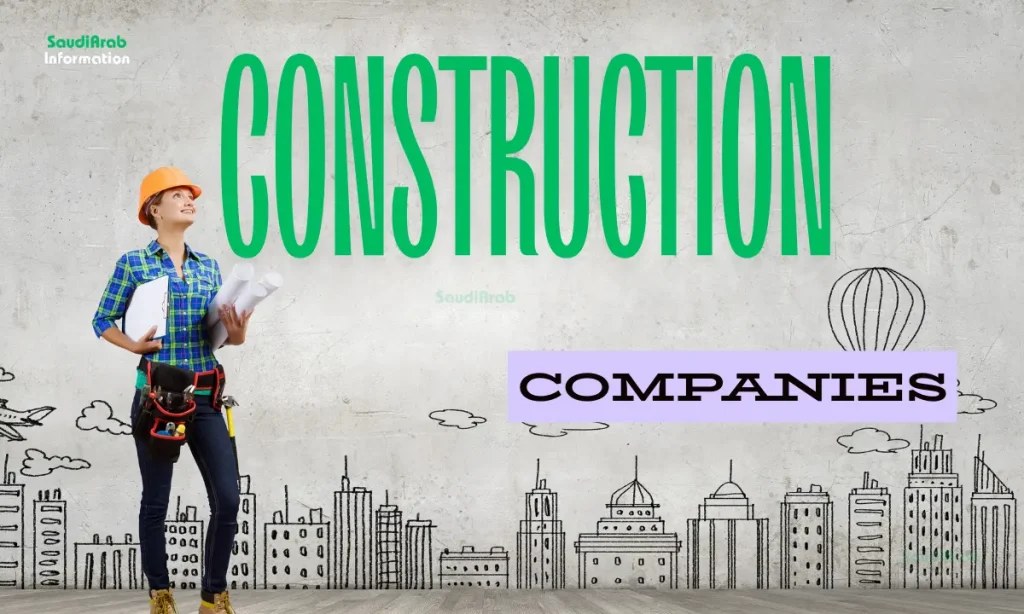Saudi Arabia is home to one of the most dynamic and rapidly growing construction sectors in the world. Driven by a blend of visionary leadership, ambitious mega-projects, and vast resources, the Kingdom has positioned itself as a global hub for construction. From futuristic cities to sprawling infrastructure projects, Saudi Arabia is actively reshaping its cities and expanding its urban footprint.
The Vision 2030 initiative is a major driving force behind this boom. It aims to diversify the economy beyond oil, with construction playing an essential role in transforming Saudi Arabia’s landscape, economy, and society. Construction companies, both local and international, are at the heart of these changes, building everything from cutting-edge infrastructure to luxury hotels and eco-friendly buildings.
Growth of the Construction Industry in Saudi Arabia
Saudi Arabia’s construction industry has seen unprecedented growth over the past few decades, establishing itself as one of the strongest in the Middle East. This expansion is primarily fueled by government-backed mega-projects and significant international investments. The Kingdom’s construction sector is currently worth billions of dollars and continues to grow with ambitious new projects.
The construction surge isn’t limited to traditional sectors like residential and commercial buildings. The Kingdom is heavily investing in smart cities, transport infrastructure, and renewable energy projects, making it a construction hotspot in the region. For example, the development of NEOM, a futuristic mega-city, has drawn global attention for its scale and ambition.
Mega-Projects Shaping Saudi Arabia’s Future
The Kingdom is undertaking several mega-projects that are reshaping its cities and economy. These projects go beyond conventional construction, incorporating technology, sustainability, and innovation to create a modern, diversified economy. Some of the most notable projects include:
- NEOM: A $500 billion futuristic city being built in the northwestern part of Saudi Arabia. NEOM aims to be powered entirely by renewable energy and integrate AI technologies.
- The Red Sea Project: A luxury tourism development that covers an archipelago of more than 90 islands. This project aims to preserve the natural environment while promoting sustainable tourism.
- Qiddiya: An entertainment city being developed outside Riyadh, Qiddiya is set to become the Kingdom’s center for entertainment, sports, and the arts, with theme parks, sports arenas, and cultural facilities.
- The Riyadh Metro: One of the largest urban transport projects in the world, this six-line metro system aims to transform mobility within the capital.
The Kingdom’s growth in construction is not just limited to infrastructure but also focuses on creating jobs, training programs, and opportunities for local talent to contribute to the industry’s future. International partnerships and the introduction of new technologies are also pushing the boundaries of what’s possible, positioning Saudi Arabia as a construction leader in the region.
These top construction companies and their projects are helping to lay the groundwork for a more sustainable, innovative, and diversified future for Saudi Arabia. Whether it’s building eco-friendly cities or expanding modern transportation systems, the construction sector plays a critical role in realizing the country’s long-term vision.
[2025] Top 10 Construction Companies in Saudi Arabia
Here are the top 10 construction companies in Saudi Arabia:
1. Saudi Binladin Group
One of the largest and most well-known construction firms in Saudi Arabia, Saudi Binladin Group has been pivotal in delivering high-profile projects, including the expansion of the Grand Mosque in Mecca.
2. Al-Muhaidib Contracting
Al-Muhaidib Contracting specializes in housing and infrastructure projects, playing a key role in meeting the Kingdom’s housing demands.
3. Nesma & Partners Contracting
Nesma & Partners is known for handling complex projects across various sectors, including healthcare, education, and energy. Their expertise has been critical in building Saudi Arabia’s infrastructure.
4. Saudi Oger
Though no longer operational, Saudi Oger’s contributions to the country’s construction sector were significant, particularly in the development of large-scale residential and commercial buildings.
5. El-Seif Engineering Contracting Company
El-Seif is a leading engineering and construction company known for its work on large-scale infrastructure and building projects, including hospitals, airports, and commercial buildings.
6. Al-Rashid Trading & Contracting Company (RTCC)
RTCC is a prominent player in infrastructure projects, with expertise in roads, bridges, water treatment plants, and urban development across Saudi Arabia.
7. Al-Kifah Contracting
Al-Kifah is well-regarded for its contributions to commercial and industrial construction, and it has played a significant role in developing housing, schools, and other public buildings.
8. ABV Rock Group
Specializing in complex construction projects such as underground tunnels, defense structures, and large-scale civil engineering, ABV Rock Group is one of the most reliable companies in Saudi Arabia.
9. Archirodon Construction
Archirodon has a strong focus on maritime construction, energy-related projects, and large infrastructure developments, particularly in the oil and gas sectors.
10. Redco Construction
Redco is highly experienced in large residential and commercial projects, and it has been involved in building some of the most iconic skyscrapers in Saudi Arabia.
11. Shapoorji Pallonji Mideast
Shapoorji Pallonji is an international construction company that has been instrumental in high-rise buildings, hospitals, and other significant infrastructure projects in the Kingdom.
12. Al Ayuni Investment & Contracting Co.
Al Ayuni is involved in numerous large infrastructure projects, including roads, bridges, airports, and other vital transport networks that connect different regions in Saudi Arabia.
13. ControlTap General Contracting Company
ControlTap specializes in MEP (Mechanical, Electrical, and Plumbing) contracting, HVAC systems, and electrical services. With its wide range of expertise, ControlTap is heavily involved in general construction, flooring, solar panel installations, and delivering turnkey projects across the Kingdom.
Sponsored: Construction Company in Saudi Arabia
14. Quality Leaders Group
Quality Leaders Group is known for its work in delivering high-quality construction and contracting services. The group specializes in energy-efficient building solutions, ensuring sustainable and modern approaches to construction in line with Saudi Arabia’s Vision 2030.
Vision 2030 and Infrastructure Development
At the heart of Saudi Arabia’s construction boom is the Vision 2030 initiative—a bold roadmap for reducing the country’s dependence on oil and creating a diversified economy. Vision 2030 places strong emphasis on sectors like tourism, entertainment, and construction, which are now experiencing rapid growth.
Government Investments and Mega Projects
One of the most significant factors fueling the construction sector’s growth is the Saudi government’s massive investments in infrastructure and industrial projects. The Kingdom has been pouring billions of dollars into key developments, aiming to modernize its cities and create opportunities for its growing population.
Major projects like the King Abdullah Financial District (KAFD) and the Riyadh Metro illustrate the government’s ambitious plans to reshape urban life and improve connectivity. The KAFD, for instance, is a state-of-the-art financial hub aimed at attracting global businesses, while the Riyadh Metro is set to revolutionize urban transport with a comprehensive, high-tech system.
In addition to these large-scale projects, the government is heavily focused on building affordable housing, modern educational facilities, and industrial zones that cater to the Kingdom’s growing population and economic ambitions. These investments are a cornerstone of Saudi Arabia’s national development plan, ensuring that cities are not only expanding but becoming more efficient and livable.
Private Sector Involvement and International Partnerships
Another critical factor in the construction boom is the active involvement of private companies and international partnerships. The Saudi government has made it easier for private firms, both local and global, to participate in these mega-projects, creating a fertile environment for innovation and collaboration.
Construction companies from around the world are entering joint ventures with Saudi firms, sharing expertise, technology, and resources to complete these massive undertakings. These partnerships are helping to bring cutting-edge technologies to the construction sector, such as green building practices, AI-driven construction management, and sustainable energy solutions.
These key factors—Vision 2030, government investments, and private sector collaboration—are transforming Saudi Arabia’s construction industry into a global powerhouse. The Kingdom’s focus on innovation and sustainability, along with its ambitious mega-projects, is not only shaping its future but positioning it as a leader in the global construction arena.
This transformation is just the beginning, and the world is watching as Saudi Arabia continues to build, innovate, and redefine what’s possible in construction.

The Diverse Scope of Saudi Arabia’s Construction Sector
The construction industry in Saudi Arabia is as vast as it is varied, covering a broad spectrum of projects that span everything from housing developments to critical energy infrastructure. As the Kingdom continues to modernize and expand, construction companies are working on transformational projects across a wide array of sectors.
Residential and Commercial Buildings
With a rapidly growing population, housing development is essential to meet the increasing demand for residential spaces. The Kingdom has been heavily investing in large-scale residential projects, focusing on affordable housing, luxury apartments, and modernized neighborhoods that align with Vision 2030’s goals of improving living standards.
In cities like Riyadh, Jeddah, and Dammam, we are witnessing a surge in high-rise commercial towers, business centers, and luxury shopping malls. These developments are transforming Saudi Arabia’s urban skylines and driving economic growth by creating vibrant city centers that attract both local and international businesses.
Moreover, projects like Kingdom Tower in Jeddah—set to be one of the world’s tallest skyscrapers—are redefining the country’s architectural ambitions. The focus on creating multi-purpose commercial buildings, combining office spaces, retail, and residential units, is also a testament to Saudi Arabia’s commitment to sustainable urbanization.
Industrial and Infrastructure Projects
Infrastructure development is a key focus area for the Kingdom as it continues to modernize and expand its urban and industrial footprint. Saudi Arabia is investing heavily in world-class infrastructure projects, including airports, roads, ports, and railways that connect its cities and regions.
One of the standout projects is the development of the King Abdulaziz International Airport in Jeddah, which is undergoing a major expansion to cater to millions of travelers and position the city as a global transit hub. Similarly, the Riyadh Metro project is set to become one of the largest urban transit systems in the world, offering efficient and modern public transportation for the capital’s growing population.
Saudi Arabia’s ambitious infrastructure development also includes industrial zones like the King Salman Energy Park (SPARK), which is dedicated to energy-related industries and aims to create thousands of jobs while supporting the growth of the Kingdom’s industrial sector.
Airports, Roads, and Railways
In recent years, Saudi Arabia has focused on positioning itself as a major transportation hub. Key projects like the Haramain High-Speed Railway—which connects the holy cities of Mecca and Medina—are pivotal in providing fast, efficient transport for millions of pilgrims each year.
The expansion of highways and upgrading of road networks across the Kingdom are also crucial to improving mobility within and between cities, ensuring that both people and goods can move seamlessly. For example, the Saudi Landbridge Project, an upcoming railway line, will connect the country’s east and west coasts, facilitating faster cargo transport and boosting economic trade.
These transportation projects not only ease congestion but also help support the Kingdom’s vision of becoming a regional logistics hub, connecting Africa, Asia, and Europe.
Energy Sector Projects
Saudi Arabia’s construction sector is also deeply tied to its energy industry, given the Kingdom’s status as a leading global oil producer. The development of refineries, petrochemical plants, and power generation facilities plays a vital role in maintaining the country’s energy dominance and supporting its domestic economic goals.
Projects like the Jubail Industrial City—one of the world’s largest petrochemical hubs—highlight the scale of industrial construction in Saudi Arabia. Alongside oil and gas infrastructure, Saudi Arabia is also expanding its footprint in renewable energy, with large-scale projects such as solar power plants and wind farms being built to support the country’s push toward sustainable energy as part of Vision 2030.
Additionally, the construction of nuclear power plants is on the horizon, further diversifying the Kingdom’s energy portfolio and reducing its reliance on oil. These projects are not only crucial for energy security but are also part of a broader vision to transform Saudi Arabia into a global energy leader across multiple sectors.
The construction sector in Saudi Arabia is truly vast, encompassing a wide range of projects that are critical to the country’s future. From housing and commercial towers to industrial hubs and transportation infrastructure, Saudi Arabia’s construction industry is driving the Kingdom’s growth and positioning it as a modern, diversified economy.
Challenges Faced by Construction Companies in Saudi Arabia
While the construction industry in Saudi Arabia is experiencing remarkable growth, it is not without its challenges. Companies working on large-scale projects must navigate a complex array of issues and obstacles that can affect timelines, costs, and the overall success of their projects. Below are some of the key challenges facing construction companies in the Kingdom.
Labor Shortages and Skill Gaps
One of the most pressing challenges in Saudi Arabia’s construction sector is the issue of labor shortages and skill gaps. The Kingdom has long relied on a foreign workforce to meet the labor demands of its rapidly expanding construction projects. This dependence on expatriates, however, presents a number of difficulties, including:
- Limited availability of skilled workers: While many expatriate workers bring valuable skills, there are often gaps in expertise, particularly in specialized areas like project management, engineering, and sustainability practices.
- Lack of local talent: Although there are government efforts to increase the participation of Saudi nationals in the workforce through initiatives like Saudization, there is still a significant gap between the skill sets of local workers and the demands of complex construction projects.
- Turnover and visa issues: High turnover rates among foreign workers, coupled with visa restrictions and changes in labor laws, can disrupt project timelines and increase operational costs for construction companies.
To address these challenges, companies are investing in training programs to upskill both local and foreign workers, but bridging the skill gap remains a long-term challenge.
Regulatory Hurdles
The regulatory environment in Saudi Arabia can be complex and challenging to navigate, particularly for construction companies handling large-scale projects. The Kingdom has introduced a series of reforms as part of its Vision 2030 initiative, but bureaucratic processes and compliance requirements can still slow down project execution.
Some of the common regulatory challenges include:
- Permitting delays: Obtaining the necessary permits and approvals can take time, especially for international companies unfamiliar with local processes.
- Complex zoning laws: Saudi Arabia has strict regulations regarding land use, especially in major cities like Riyadh and Jeddah. Zoning restrictions can make it difficult for companies to identify suitable project locations.
- Adherence to local standards: Companies must ensure that their projects meet local building codes, safety standards, and environmental regulations, which may differ significantly from international norms.
Moreover, contracting laws and regulatory frameworks are constantly evolving, which can introduce uncertainty into project planning and execution. Construction companies must be agile in responding to these regulatory shifts, while also ensuring compliance with local laws to avoid delays and penalties.
Environmental and Sustainability Issues
As Saudi Arabia pushes forward with its Vision 2030 goals, sustainability is becoming an increasingly important consideration in the construction industry. However, the drive for sustainability presents several challenges for construction companies that must balance economic growth with environmental responsibility.
Some of the key environmental and sustainability challenges include:
- Balancing development with environmental impact: Many of Saudi Arabia’s mega-projects are located in environmentally sensitive areas, such as coastal regions and deserts. Companies are under pressure to minimize their ecological footprint while still delivering large-scale developments.
- Sustainable materials and practices: The use of green building materials and sustainable construction techniques can increase costs, making it harder for companies to stay within budget. Furthermore, sourcing sustainable materials in the region may be limited, adding logistical complexity to projects.
- Energy efficiency and waste management: Projects must now incorporate energy-efficient designs and adopt waste management practices to align with Saudi Arabia’s push for sustainable urbanization. Meeting these new requirements often involves retrofitting designs or investing in new technologies, which can extend project timelines and increase costs.
In addition to these challenges, climate conditions in Saudi Arabia, such as extreme heat and arid environments, further complicate efforts to implement sustainable construction practices. Companies must find innovative solutions to reduce energy consumption and improve environmental performance without compromising on quality or cost-effectiveness.
Financial and Market Volatility
Though not always highlighted, financial and market volatility is another significant challenge facing construction companies in Saudi Arabia. The Kingdom’s economy is still closely tied to oil prices, and fluctuations in the global oil market can have ripple effects on public spending and infrastructure investments.
Companies may experience:
- Project delays or cancellations due to shifts in government priorities or budget reallocations.
- Cost overruns caused by market volatility affecting material prices and supply chain logistics.
- Financing difficulties, especially for large projects, as construction companies and investors face uncertain economic conditions.
To mitigate financial risks, companies are increasingly seeking public-private partnerships (PPP) and alternative financing models to ensure that projects are adequately funded and insulated from market shocks.
Technological Integration
While the global construction industry is rapidly adopting new technologies like AI, BIM (Building Information Modeling), and drones, many companies in Saudi Arabia face challenges in integrating these tools effectively. Implementing advanced technologies can improve project management, reduce costs, and enhance efficiency, but technological integration is not without its hurdles:
- High upfront costs: The initial investment required to adopt new technologies can be prohibitive for smaller companies.
- Training and expertise: The lack of skilled personnel who can operate and manage advanced technologies is a significant barrier to adoption. Companies must invest in training programs to upskill their workforce.
- Resistance to change: Some companies may be reluctant to adopt new technologies due to traditional construction practices or a lack of understanding of the potential benefits.
However, overcoming these challenges will be crucial for Saudi Arabia’s construction sector to stay competitive on a global scale.
Despite these challenges, Saudi Arabia’s construction sector continues to grow, driven by Vision 2030’s ambitious plans and the country’s relentless push towards modernization and diversification. Companies that can navigate labor issues, regulatory complexities, and environmental demands while embracing technological innovation will be well-positioned to thrive in this fast-evolving market.
The Role of Technology in the Construction Sector

As construction projects in Saudi Arabia grow in complexity and scale, technology is playing an increasingly pivotal role in transforming the industry. From advanced planning tools to cutting-edge robotics, technological advancements are helping companies streamline processes, reduce costs, and meet the ambitious goals of Vision 2030. Below are some of the key technologies reshaping the construction landscape in the Kingdom.
Adoption of Building Information Modeling (BIM)
The use of Building Information Modeling (BIM) has become a game-changer in the construction sector. BIM technology allows for the creation of detailed 3D models that integrate architectural, structural, and engineering data into a single digital platform. This enables real-time collaboration between various stakeholders—architects, engineers, contractors, and clients—during every phase of the project.
Some of the key advantages of BIM include:
- Improved project visualization: By providing a clear, 3D view of the project, BIM allows all parties to better understand design intentions, spot potential problems early, and make more informed decisions.
- Enhanced coordination and efficiency: BIM helps to eliminate conflicts between different project components (such as plumbing, electrical, and structural elements), leading to smoother project execution and fewer delays. It also allows for better cost estimation and material management.
- Sustainability insights: With BIM, companies can simulate and analyze the environmental impact of their construction choices, allowing them to make more sustainable decisions, such as choosing energy-efficient designs or optimizing material usage.
In Saudi Arabia, BIM is becoming a standard practice for major construction projects, particularly in megaprojects like NEOM and Qiddiya, where its ability to manage large-scale developments is essential for success.
Use of AI and Robotics in Construction
Artificial Intelligence (AI) and robotics are increasingly being integrated into construction operations, bringing a new level of automation and efficiency to the industry. AI is used in various aspects of construction, from project management and risk assessment to material procurement and safety monitoring.
Key benefits of AI in construction include:
- Predictive analytics: AI-driven software can analyze large datasets to predict project risks, such as cost overruns, material shortages, or weather-related delays. This allows construction teams to make proactive decisions and avoid costly setbacks.
- Site monitoring and safety: AI-powered cameras and sensors can monitor construction sites in real-time, identifying safety hazards, ensuring compliance, and even detecting machinery faults before they cause major issues. This leads to a safer and more efficient work environment.
- Enhanced productivity: AI can help optimize scheduling and resource allocation, ensuring that the right materials and workers are in the right place at the right time, which helps reduce project timelines.
Robotics, on the other hand, is increasingly being deployed for tasks like bricklaying, demolition, and excavation. These machines can operate 24/7, completing repetitive tasks faster and more accurately than human labor, which not only cuts down labor costs but also reduces human error.
Sustainable Construction Practices
In today’s world, sustainability has become a key focus for the construction sector, and Saudi Arabia is no exception. With the Vision 2030 initiative promoting environmentally conscious development, construction companies are being challenged to adopt sustainable practices that minimize environmental impact while still delivering high-quality projects.
Some of the most important sustainable construction trends include:
- Reducing waste: Many construction companies are adopting lean construction principles, which focus on reducing waste at every stage of the building process. This includes better material management, recycling of construction debris, and the use of prefabricated building components that reduce the amount of on-site waste.
- Energy efficiency: Energy-efficient designs and building materials are becoming a top priority. Projects are incorporating smart technologies like energy-efficient lighting systems, insulation solutions, and solar panels to reduce the energy consumption of completed buildings.
- Green building materials: The demand for eco-friendly materials is growing. Construction companies are increasingly using recycled materials, sustainable timber, and low-carbon cement in their projects. These materials help to lower the carbon footprint of construction activities and create healthier, more sustainable buildings.
- Water conservation: Given Saudi Arabia’s arid climate, water conservation is a critical issue. Construction companies are implementing water-saving techniques such as greywater recycling systems and efficient irrigation solutions for landscaping in large developments.
Incorporating sustainable practices not only helps companies comply with environmental regulations but also aligns with the growing demand for green building certifications like LEED (Leadership in Energy and Environmental Design), which has become increasingly popular in the Kingdom.
Drones and 3D Printing
Drones and 3D printing are two other groundbreaking technologies making a significant impact on the construction sector in Saudi Arabia.
Drones are being used for site surveying, aerial inspections, and progress tracking. They provide real-time data and high-resolution imagery that help project managers make better decisions regarding site layout, safety, and planning. Drones also reduce the time and cost associated with traditional surveying methods.
3D printing is another innovative technology gaining traction in the Kingdom’s construction projects. This technique allows companies to print building components layer by layer, which reduces the need for traditional construction methods, cutting down on both labor and material costs. The potential for 3D-printed homes and infrastructure could revolutionize the way construction is done in Saudi Arabia, offering faster, more sustainable construction solutions.
The Future of Technology in Construction
The future of Saudi Arabia’s construction industry will undoubtedly be shaped by the continued integration of technology. As the Kingdom embarks on more high-tech mega-projects and smart cities, the use of AI, robotics, BIM, and sustainable building practices will become even more prevalent. Companies that invest in these technologies now will be better positioned to succeed in an increasingly competitive and technologically driven market.
Technology is not just a tool—it’s becoming the foundation for innovation, efficiency, and sustainability in Saudi Arabia’s construction industry. As companies adapt to these new advancements, the future of construction in the Kingdom looks bright, with the promise of smarter, greener, and more efficient buildings.
The Impact of Vision 2030 on Construction
Vision 2030 is not just a government initiative; it’s a transformative framework that is reshaping Saudi Arabia’s economic and social landscape, particularly in the construction sector. The ambitious goals set forth in this vision are driving numerous projects and strategies that aim to diversify the economy, improve living standards, and position the Kingdom as a global leader in various sectors, including construction.
Development of Smart Cities
One of the most exciting components of Vision 2030 is the development of smart cities, with NEOM leading the charge. This monumental project is not only ambitious but groundbreaking, aiming to create a city that redefines urban living.
- Futuristic Design: NEOM is envisioned as a city of the future, where every aspect is integrated with cutting-edge technology. Imagine automated public transport systems, AI-powered public services, and real-time data analytics being utilized to enhance the quality of life for residents.
- Renewable Energy Focus: NEOM is set to be powered entirely by renewable energy sources, showcasing the Kingdom’s commitment to sustainability. This focus on green energy is pivotal in minimizing the carbon footprint of urban living, setting a benchmark for cities around the world.
- Integration of Nature and Urban Life: The design philosophy behind NEOM emphasizes harmony with nature. Plans include green spaces, parks, and coastal areas that encourage outdoor activities and promote well-being, aiming to create a livable environment that nurtures both body and spirit.
Green and Sustainable Building Initiatives
Sustainability is at the core of Vision 2030, and this principle is reflected in the push for green building initiatives across the Kingdom.
- Energy-Efficient Construction: New regulations encourage the use of energy-efficient designs, sustainable materials, and technologies that minimize waste and energy consumption. Buildings constructed under these guidelines are not only better for the environment but also offer significant cost savings over time.
- Environmental Assessments: As part of the construction approval process, projects are now required to undergo rigorous environmental impact assessments to ensure they align with sustainable development goals. This scrutiny helps to protect natural resources and biodiversity.
- Green Certifications: Developers are increasingly seeking green building certifications such as LEED (Leadership in Energy and Environmental Design) to demonstrate their commitment to sustainability. This not only enhances their reputation but also attracts eco-conscious investors and tenants.
Transport Infrastructure Boost
As part of Vision 2030, Saudi Arabia is making significant investments in its transportation infrastructure, aiming to enhance connectivity both domestically and internationally.
- New Airports and Expansions: The expansion of airports, such as King Abdulaziz International Airport, is designed to increase capacity and improve passenger experience. These projects are crucial for facilitating tourism and international business, which are central to Vision 2030’s goals.
- Metro Systems: Major cities like Riyadh are witnessing the development of extensive metro systems designed to reduce traffic congestion and provide efficient public transport. The Riyadh Metro is expected to revolutionize urban mobility, making the city more accessible and reducing reliance on cars.
- Logistics Hub: With these developments, Saudi Arabia is positioning itself as a key global logistics hub. Improved transport infrastructure will facilitate trade and commerce, attracting foreign investment and fostering economic growth.
Employment Opportunities in the Construction Industry
The construction boom fueled by Vision 2030 is creating a myriad of employment opportunities, transforming the job market in Saudi Arabia.
- Skilled and Unskilled Labor Demand: The rapid pace of construction means that there is a growing demand for both skilled professionals—like engineers, architects, and project managers—and unskilled laborers who can support various construction tasks. This demand is vital for meeting project timelines and ensuring quality.
- Diverse Career Paths: The construction industry offers a wide range of career paths, from technical roles in engineering and design to operational roles in project management and logistics. This diversity allows individuals from different educational backgrounds to find a niche that suits their skills and interests.
- Training Programs for Local Workers: Recognizing the need for a skilled workforce, the Saudi government is investing in training programs aimed at equipping local workers with the necessary skills to thrive in the booming construction sector. These programs focus on both technical skills and soft skills, ensuring that participants are well-prepared for the challenges of modern construction environments.
- Partnerships with Educational Institutions: Collaborations between construction companies and educational institutions are becoming more common, allowing students to gain hands-on experience through internships and practical training. This approach not only benefits the students but also helps companies build a pipeline of talent that meets their specific needs.
Conclusion
The impact of Vision 2030 on the construction sector in Saudi Arabia is profound and multifaceted. From the creation of futuristic smart cities like NEOM to the emphasis on sustainability and enhanced transportation infrastructure, the construction industry is poised for remarkable growth. The demand for skilled labor and innovative training programs further illustrates the commitment to not only building structures but also building a robust workforce capable of meeting the Kingdom’s ambitious goals. As these initiatives continue to unfold, the future of construction in Saudi Arabia looks brighter than ever.
FAQs
What is Vision 2030?
Vision 2030 is Saudi Arabia’s plan to diversify its economy and reduce dependence on oil by developing other sectors like construction, tourism, and entertainment.
What are the major construction companies in Saudi Arabia?
Some major construction companies include Saudi Binladin Group, Al-Muhaidib Contracting, Nesma & Partners Contracting, and Saudi Oger.
How has technology impacted construction in Saudi Arabia?
Technology has revolutionized construction through the adoption of BIM, AI, robotics, and sustainable practices.


